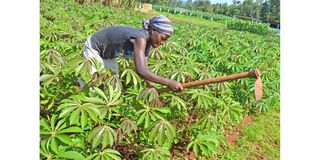To build agriculture sector, strengthen public and private ties

A farmer weeds her cassava crops. Through public-private partnerships (PPP), dozens of private players have joined forces with the government to train such farmers, offer them farm inputs and ensure they get extension services.
What you need to know:
- One of the things that have helped spur this growth is the partnership between the government and various private players.
- Multinational firm Bayer, for instance, is currently supplying some 120,000 smallholders in 15 counties with high-yielding maize and vegetable seeds to stem a possible food crisis resulting from a myriad of factors, key among them the Covid-19 crisis.
- A dysfunctional agriculture industry translates to massive poverty especially in the rural areas, unemployment and sluggish economic growth while the opposite can leapfrog our national prosperity in record time
- There is an indication of better days ahead going by the optimism exuded by the various organisations sharing in the efforts to yield a heavier basket in pursuit of a food security.
The country’s agriculture sector has grown in leaps and bounds in the past years across the various value chains.
One of the things that have helped spur this growth is the partnership between the government and various private players.
Commonly known as the public-private partnership (PPP), dozens of private players have joined forces with the government to train farmers, offer farm inputs and ensure they get extension services.
Multinational firm Bayer, for instance, is currently supplying some 120,000 smallholders in 15 counties with high-yielding maize and vegetable seeds to stem a possible food crisis resulting from a myriad of factors, key among them the Covid-19 crisis.
Under the initiative dubbed “Better farms, better lives”, Bayer has partnered with the Alliance for a Green Revolution in Africa, county governments in targeted regions, Cereal Growers Association and the national government as it seeks to boost farm productivity and yields.
Push by private sector
The renewed push by private sector to get more involved in food production is a timely development, coming at a time when the government, in partnership with the private sector-led Agriculture Sector Network (Asnet), is laying a firm foundation for agriculture transformation.
Through PPP initiatives, the agriculture industry is getting back on track after decades of deterioration of support structures and systems required for a thriving farm economy.
A dysfunctional agriculture industry translates to massive poverty especially in the rural areas, unemployment and sluggish economic growth while the opposite can leapfrog our national prosperity in record time.
The Ministry of Agriculture has endorsed Asnet, which is led by Mr Bimal Kantaria, the managing director of Elgon Kenya, noting that it will help create a nexus between policy and practice and renewed synergy.
Vibrant agriculture industry
It is thus a matter of time before the country starts seeing tangible benefits of strong PPPs that are in the offing.
There is an indication, thus, of better days ahead going by the optimism exuded by the various organisations sharing in the efforts to yield a heavier basket in pursuit of a food security.
As the world recovers from the effects of Covid-19 that have grounded businesses since March, it is emerging that Kenya stands tall as the country that kept supplies of horticulture produce, tea and coffee in supermarket shelves in Europe and Asia replenished.
Brand Kenya emerged strong during the pandemic period as exporters and support systems all worked together to deliver Kenya produce to our key markets.
The combined efforts attest to achieving a responsive vibrant agriculture industry.





